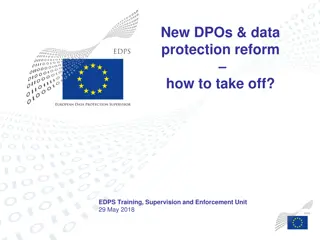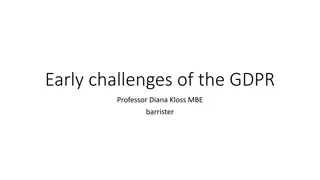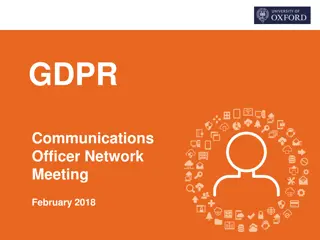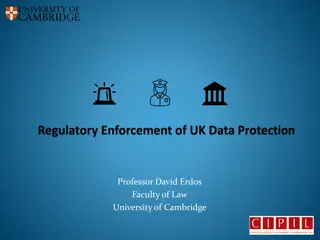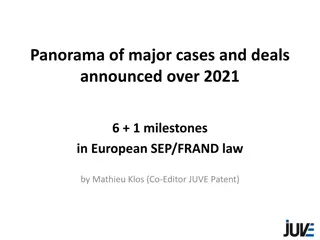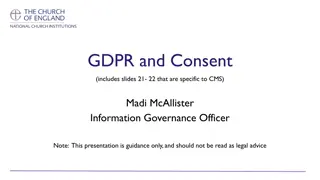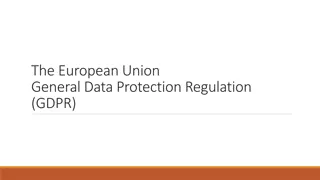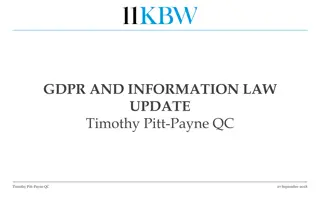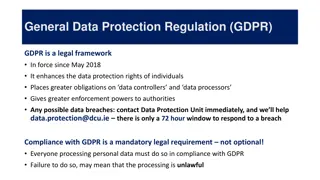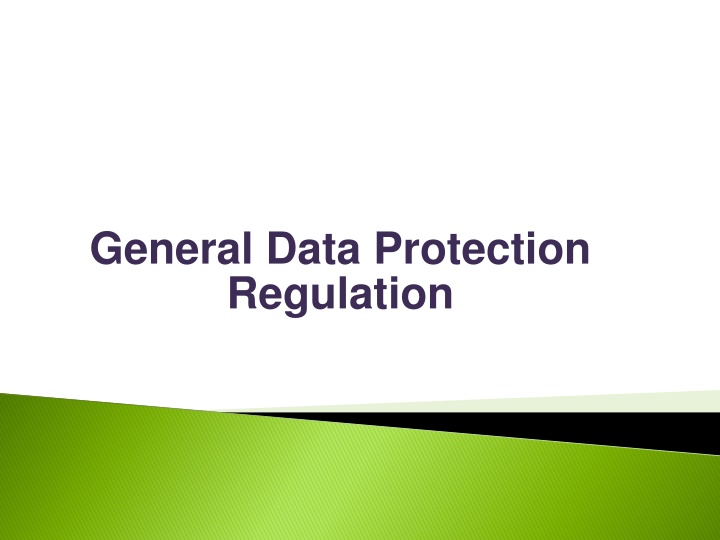
General Data Protection Regulation (GDPR) and Its Implications
Dive into the world of GDPR with insights on its background, impact on customers and firms, regulatory actions, personal data protection, legal basis for data processing, enforcement since May 2018, and the aim of ensuring standardized data protection across EU member states. Learn about the significant powers and fines imposed by the Information Commissioner's Office (ICO) under GDPR.
Uploaded on | 2 Views
Download Presentation

Please find below an Image/Link to download the presentation.
The content on the website is provided AS IS for your information and personal use only. It may not be sold, licensed, or shared on other websites without obtaining consent from the author. If you encounter any issues during the download, it is possible that the publisher has removed the file from their server.
You are allowed to download the files provided on this website for personal or commercial use, subject to the condition that they are used lawfully. All files are the property of their respective owners.
The content on the website is provided AS IS for your information and personal use only. It may not be sold, licensed, or shared on other websites without obtaining consent from the author.
E N D
Presentation Transcript
General Data Protection Regulation
alanchandler@uwclub.net I have trained more than 2,000 individuals to become ACII qualified I have trained over 50% of the individuals in the last 8 years that have gone onto achieve the highest ACII pass in the whole of the UK. I train to a pass rate of more than 96% in all CII qualification levels. Certificate , Diploma and Advanced Diploma. I deliver the Allianz scholarship and academy programmes in both the UK and Ireland and I have been a Cii examiner. I have trained students who have won national prizes in almost all ACII subjects including Insurance Law (MO5), Liability (M96), Commercial Property and BI (M93), Personal Lines Insurance (P86), Business and Finance (M92), Underwriting Practice (M80), Advanced Underwriting (960), Claims Practice (M85), Advanced Claims (820), Marketing (945), Advanced Broking (930) and Advanced Risk Management (992). I have trained more than 2,000 individuals to become ACII qualified
Understand the background to GDPR Describe what the changes are Explain what the impact is on customers and firms and risks associated Understand what the regulators are doing with GDPR since the launch
Some background to the Regulation The definition of personal data What is meant by protection Establishing your legal basis for processing data
GDPR came into effect 25th May 2018, and will stay regardless of Brexit The UK government has enacted the requirements of the GDPR through the Data Protection Act 2018 The GDPR is a Regulation not a Directive
The Aim is: The Aim is: To ensure the same standard of Data Protection across all EU Member States To strengthen the rights of individual Data Subjects To ensure the free flow of data between EU Member States is effective and protected
Recital 4 of GDPR states The Processing of Personal Data should be designed to serve mankind.
ICO will have increased powers (bigger fines!) Previous maximum fines under DPA was 500,000 New powers may increase to 20m Euros or up to 4% of global turnover, whichever is greater
First major GDPR fine was a Portuguese hospital hit by their equivalent of the ICO, fine 400,000 euros for breaches including allowing 985 users doctor level privilege even though they only had 296 doctors!
In 2013/14 Yahoo had the greatest data breach in history with 3 billion user accounts being breached, it did not notify anyone until well after 72 hours. Experts have estimated the GDPR fine would have been between 60m - 120m
Equifax had one of the largest cyber attack in history where personal information of over 143m customers was compromised and more than 200,000 credit card holders had their full details exposed they did co operate with the authorities but delayed telling anyone, their fines would have ranged from 8m upwards in the new regime e Bay had 145m of their customers details compromised in 2014 it is anticipated this fine would have been between 8m- 16m
More than 200,000 breaches reported across the EU in the first 9 months ICO have stated that the number of data protection complaints have doubled from 21,000 to 42,000 last year The ICO have been given an annual budget increase of 43m compared to 27m and now employ 722 staff expect more proactivity!!!
The ICO in the past tended to only fine as a last result Of the 18,300 data protection cases it handled in 2016/17 it issued just 16 fines totalling 1.6m But this is starting to change .
ICO recently fined Bounty UK (under DPA 1998) , a pregnancy and parenting club 400,000 for illegally sharing data of more than 14m people with credit referencing and marketing agencies. Having a choice over your data being shared was almost non existent = not good enough
More recent fines Firms that should know better, eleven charities fined including: Guide dogs for the Blind 15,000 Royal British Legion 12,000 WWF 9,000 Oxfam 6,000 Sharing data without permission British and foreign Bible Society fined 100,000 for insufficient security on internal network, the data hacked included card and bank details of 417,000 supporters
Equifax fined maximum of 500,000 in 9/18 for failing to protect personal data of 15m UK citizens following a cyber attack in 9/17 ICO find Facebook the max of 500,000 following their role in Cambridge Analytica ICO fined Tax Returned Ltd 200,000 for sending 14.8m unsolicited texts without valid consent between 7/16 and 10/17
Still working through the backlog of DPA 1998 complaints and the UK does like an orderly queue moving in correct chronological order (until just now!) The ICO issued an enforcement notice on a Canadian analytics firm Aggregator IQ Data Services stopping them processing personal data of any EU citizen they were involved in the Cambridge analytical scandal and were found to be processing data without consent. All seemed quiet on the ICO front and then .
The ICO were not the first out of the blocks but they have just set some eye watering fines: BA 183.4m (1.5% of annual turnover) the maximum could have been 4% which would have been 489m Marriott 99m (3% of annual turnover) Money goes to the Treasury but ICO are trying to get some diverted to themselves to deal with future legal appeals!!!
British Airways is to be fined more than 183m by the Information Commissioner s Office after hackers stole the personal data of half a million of the airline s customers. The ICO said its extensive investigation found that the incident involved customer details including login, payment card, name, address and travel booking information being harvested after being diverted to a fraudulent website. The ICO said that data breach, which began in June 2018, occurred because British Airways had poor security arrangements in place to protect customer information being accessed
Marriotts 99m fine was the result of a data breach that lasted over four years between 2014 when it began and then discovered in 2018 and exposed in the region of 339 million guest records globally. Like BA bet they wish this breach had been discovered before May 2018 as fine would have only been 500,000 !!!!
ICO commissioner Elizabeth Denham said that when organisations fail to protect data from loss, damage or theft, it is more than an inconvenience. "That's why the law is clear when you are entrusted with personal data, you must look after it. Those that don't will face scrutiny from my office to check they have taken appropriate steps to protect fundamental privacy rights, she cautioned
Once they start processing the fines under the GDPR, the ICO have stated that each breach will be on a case-by-case basis in the spirit of being effective, proportionate and dissuasive . They will take into account previous attempts to comply and also actions taken to mitigate damage if you have well documented Data Protection procedures this will bode well if there is a issue. The ICO have also been clear that firms that self report will be looked on favourably.
For the rest of Europe there has been 63 m euros in fines so far across the Eu (which all of a sudden looks low due to the ICO actions) 57M of this was Google in France ! fined by the French watchdog the Commission Nationale de l informatique et des libertes (CNIL). The action was brought by two French privacy activists groups. If you have business in France be extra cautious! CNIL felt Google had created a lack of transparency on how personal data would be used
CNIL also did not like the fact that users would have to click through many different pages and connections to see what their data was being used for, rather than one easy to use central place. Remember Google data is stretched over many different sources e.g. google maps, G mail, You tube, browsing data etc, if you wanted to see the whole usage policy you had to click in many different places as the usage policy was spread over many pages in different locations not good enough said the French regulator
The CNIL were particularly critical about how the information provided by Google on how they point ads at you, based on the data they hold on you. In their opinion this was far from transparent and this led the CNIL to conclude that there was no legal basis of consent as the user had no idea what they were consenting to! Google are appealing to the French Supreme court for administration.
Reporting of serious breaches has become mandatory Non EU countries will have to comply if they want to offer goods or services in the EU Marketing will pose extra risks
In the GDPR, Personal Data is defined as: any information relating to an identified or identifiable In the GDPR, Personal Data is defined as: any information relating to an identified or identifiable natural person ( data subject ); natural person ( data subject );
An identifiable natural person is one who can be identified, directly or indirectly, in particular by reference to an identifier such as a name, an identification number, location data, an online identifier or to one or more factors specific to the physical, physiological, genetic, mental, economic or social identity of that natural person
The GDPR definition of Personal Data is wider than the definition under the DPA It is designed to take account of new technologies and ways of doing business that have developed since the 1998 Data Protection Act (when we used to watch analogue TV and dial up via a modem to connect our PCs to the internet!)
It now includes biometric data such as fingerprints, iris scanning, voice recognition and facial images Think about how much Google knows about us, it is scary
Personal data relating to certain classes of data are known as Special Categories of data (previously referred to as Sensitive Personal Data and cannot be processed without explicit consent and where the Government allows Data for Life Assurance explicit consent and where the Government allows such as holding Health Care
Special Categories could be described as those characteristics for which a person may be discriminated against
These include: Racial or ethnic origin Political opinions, religious or philosophical beliefs Trade union membership Genetic and biometric data Health** Sex life or sexual orientation
GDPR leaves Member States to decide where to allow the processing of Criminal Convictions Are the UK insurance systems good enough here!
The subject of Data Protection viewed in two parts: Data Protection can be Protection (and security) of data The use (or processing) of data
Protection and secure this is very much in the hands of the IT Department Protection is about keeping data safe Processing the data: How you collect and store it What you use it for Who you pass it to Processing is about what you do with Firms need to address both areas
Under GDPR, a firm must have a valid Legal Basis for processing data There are six legal bases data six legal bases for processing Its not all about consent!
Consent Necessary for a contract Where there is a legal obligation E.G. telling hse about fleas in your office! Vital interests RTA, processing of data without their knowledge Public interest E.G. Police Legitimate interest E.G. Marketing to previous Customers
The right to be informed about the use of data The right of access to your data The right to rectification The right to erasure The right to restrict processing The right to data portability The right to object Rights in relation to automated decision making and profiling (excluding contracts)
They have a right to access the data you hold on them (free of charge previously many companies charged 10 for this) Access is obtaining Personal Data a firm holds on you, whereas Portability means Data you have submitted being transferred to you or another firm They have a right to data portability (where data is processed by machine, example telematics devices, data on the device can be requested but not the analysis) if technically feasible
They have the right to request the information you hold on them be corrected or erased however erasure may not apply to many Insurance Contacts Where processing is based on consent, they have a right to withdraw this at any time They have the right to complain to ICO People under the age of 18 have the right to have their data erased (for example Facebook postings)
All Data Subjects will have the right to object to direct marketing This right should be explicitly brought to their attention, and presented clearly and separately from any other information
GDPR states that a firm must inform a Data Subject of this right at the time of the first communication This means that when a firm collects data it must give the Data Subject options about whether to receive Marketing or not Effectively, this means they must Opt-in
Under GDPR, a firm must have a valid Legal Basis for its Marketing activities The Legal Basis for insurance broking marketing activities is likely to be either Legitimate Interest Legitimate Interest or Consent Consent
GDPR explains the Legal Basis of Legitimate Interestas Processing is necessary for the purposes of the legitimate interest pursued by the controller or by a third party, except where such interests are overridden by the interests or fundamental rights and freedoms of the data subjects which require protection of personal data, in particular where the data subject is a child
GDPR tells us that The processing of personal data for direct marketing purposes may be regarded as carried out for a legitimate interest We take this to mean a firm can market to its own Customers about products & services they have shown an interest in previously, as they are able to now The marketing material should be subject matter that the Customer would reasonable expect to receive from that provider so no surprise to hear from you






